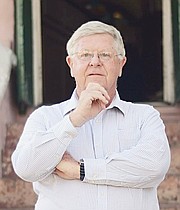By DR MIKE NEVILLE
“Before you can break out of prison you must realise that you are locked up,” – Unknown.
The great war on drugs! Wars cause untold devastation, death, disability both physical and mental and some people profit enormously. Drug wars are the same, death by overdose, bad reactions, murder and of course massive profits for sellers, suppliers and financiers. I am told the economy of The Bahamas benefited from the cocaine trade but the social price in addiction, crime, guns and death was always too big a price to pay. This desire to decide which are good drugs and which are bad drugs so we can fight over their use is a concept that in my humble opinion is doomed to fail.
There is a very simple fact call it a formula which helps us understand drugs— all drugs have both good and bad effects.
The good effects are part of modern medicine and treat all sorts of illnesses and really save lives; the bad effects are the devastation mentioned above.
To balance my equation, we need to know if we are allergic to the drug, when even a so-called good drug can create horrendous effects. We need to know how much of the drug we are taking and the speed we are consuming it, this is called the delivery system.
A good example is aspirin, in many ways a wonder drug, used for pain, fevers, inflammation and as an anticoagulant in heart patients, it is even cheap and has no restrictions on its sale. Some people are allergic to aspirin but even if you are not, if you take too much it can burn holes in your stomach which causes bleeding and can cause death, as can a simple overdose. A wonder drug that can kill!
I talked about alcohol earlier and most of us know that drinking a bottle of cold beer slowly is totally different from drinking a bottle of rum rapidly.
Cocaine first came on the scene in the Inca culture, the leaves were chewed and a mild stimulant effect helped people work at high altitudes. Cocaine hydrochloride was isolated from the leaves in 1860 and rapidly gained a reputation as a wonder drug. It was used to increase energy, served in drinks and even injected intravenously as an adjunct to psychotherapy by Sigmund Freud himself. The ensuing addictions and paranoid psychosis put a damper on its use until the eighties when The Bahamas became the international laboratory for freebase, now known as crack. The addiction proved to be so powerful that the profiteers soon marketed it heavily in North America and then the rest of the world.
Heroin is generally regarded as the worst drug around. The very word conotates evil and certainly it creates a devastating addiction that leaves a path of destruction and death. The other side of the equation is that when working in general medicine in England, I was licensed to prescribe heroin for terminal illness and it is excellent giving good pain management whilst allowing the patient to remain mentally clear.
Cannabis, weed, pot, herb the names go on forever, not too different from the drug itself. The active ingredient tetra- hydro cannabinol breaks down into numerous active isomers which affect us differently, in effect it is more than one drug and like other drugs the effects depend on the strength and delivery system. Small doses are probably safe for most people, large doses not so safe. There is also the problem that if you happen to have the genetic make-up that makes us vulnerable to psychosis then cannabis triggers psychosis in these vulnerable people.
The great war on drugs seems to me to have been a complete failure; drugs are plentiful and relatively cheap and educational efforts seem to be failing so we are faced with a conundrum. Why not try something else? There is an old saying that the only good thing about banging your head against a brick wall is when you stop. There is a pressing need for international social research as to what happens when we change drug laws. Spain briefly legalised all drugs but drug tourism put a stop to that before true results could be evaluated. Many countries are changing their laws on cannabis use and time will tell if that is the correct way to go. Amsterdam poured money into drug education and treatment, whilst decriminalising cannabis use and granting cafes licenses to sell it. They also sent ambulances with uniformed nurses into drug affected areas where heroin addicts could get their drugs administered by the nurse free. It showed everyone that addiction was a medical problem and they really took the cool out of “drugs”.
I am not sure where the answer lies but as with all medical and social problems controlled international research must be the best way to find the answer.
• Dr Mike Neville is a forensic psychiatrist who has practised for more than 40 years in The Bahamas, working at Sandilands, the prison and in private practice. Comments and responses to mneville@tribunemedia.net





Comments
Use the comment form below to begin a discussion about this content.
Sign in to comment
OpenID